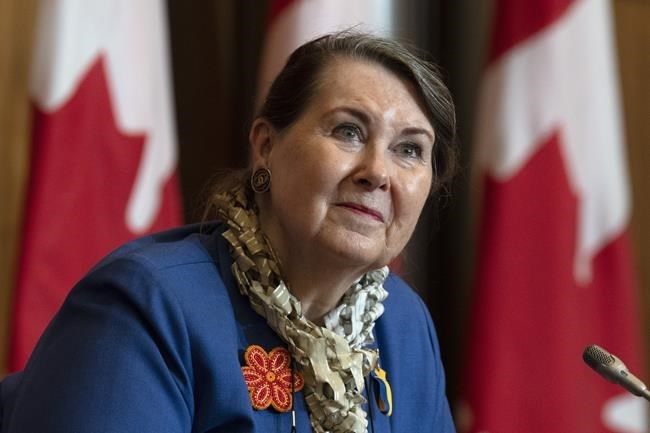OTTAWA — A Manitoba senator who denies falsifying travel documents says several cabinet ministers were aware of her choice to send letters to Afghans to help them flee as the Taliban took over the country, and that no one told her to stop.
The Globe and Mail reports that 150 Afghans who received letters from Sen. Marilou McPhedran are now stranded in an Albanian hotel room, unable to come to Canada as refugees because the government deems their documents inauthentic.
McPhedran told the House of Commons immigration committee today that then-defence minister Harjit Sajjan and Maryam Monsef, women and gender equity minister at the time, knew she was planning to send documents to Afghan refugees to help them get out of the country in 2021.
She said she believes former foreign affairs minister Marc Garneau and Marco Mendicino, who was then immigration minister, also knew.
"It's very clear that there are communications about getting out as many of these facilitation letters as possible," McPhedran told the committee Wednesday, adding that ministers were copied on emails to that effect.
She said the ministers never responded to her specifically about the letters, but they did email her back about the evacuation efforts in Afghanistan.
They never told her to stop what she was doing, she said.
The Immigration Department had issued several authentic letters directly to Afghan nationals who were eligible to come to Canada to help them clear checkpoints in Afghanistan, but didn't allow third parties to issue them on the government's behalf.
The situation was referred to the RCMP, which determined it cannot pursue a viable investigation.
McPhedran told the committee she was given a template for a visa facilitation letter by Sajjan's then-chief of staff to help Afghans clear checkpoints to leave Afghanistan.
She said the template came from George Young in an email that said "I have received this from a colleague at (Global Affairs Canada), try it."
The form letter suggested it was for Canadian citizens, so she asked for a revision and quickly received a new template with the words "Canadian citizen" removed.
"I trusted then, as I do now, that the facilitation template which Mr. Young provided, I trust them to be authentic and they helped save many lives," she told the committee.
Sajjan and Mendicino did not immediately respond to a request for comment, and former ministers Garneau and Monsef could not immediately be reached.
In a statement, the Immigration Department says it can't give further details because of ongoing litigation.
After the meeting, NDP immigration critic Jenny Kwan said ministers needed to provide clarity to the committee.
"The real question, for me, is ministerial accountability," Kwan said.
Minister Sajjan is expected to appear before the committee next week, and Garneau has also been invited to testify.
MPs from all parties expressed serious concern about the lack of fairness, lack of vetting, and lack of due process associated with the senator's actions.
"None of us would ever do this, regardless of political stripe because of the division of power, and because of the danger they can pose to soldiers, there areequity issues," said Conservative MP MichelleRempelGarner.
McPhedran's office sent the letters directly to Afghans and she also shared the template with "trusted advocates," including the chief human rights officer with FIFA and a former Canadian Olympian.
She said she doesn't know for sure how many of the letters were issued, to the best of her knowledge it was about 640.
"I wasn't keeping track of the numbers. It was, get as many people — as many women — as possible out," she said.
McPhedrantold the committee she provided a rolling list of names to the government who "put them in the system."
She also told the committee she believed the letters were intended to get Afghans through checkpoints and out of the country, not to grant them access to Canada, though the letter itself states that the recipient has been granted a visa to enter Canada.
The senator countered that she wasn't responsible for the content of the letter, she received it from the government.
RempelGarner said a family member of one of her constituents received the letter and believed they had indeed been granted permission to come to Canada.
"Senator, you put my (constituent's) family's lives at risk," Rempel Garner told McPhedran. "They put their lives in danger. They weren't able to apply for regular programs."
McPhedran said she rejected the allegation.
The committee was abruptly adjourned one hour early with the support of Liberal and Bloc Quebecois members. Several MPs said it was because they needed to go vote in the house while Liberal MP Arielle Kayabaga said she felt they had exhausted their questions, which were becoming repetitive.
McPhedran said she stands by the choices that she made.
This report by The Canadian Press was first published April 19, 2023.
Laura Osman, The Canadian Press



